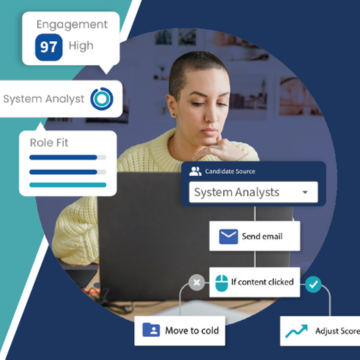- Solutions
- Products
- Community
- Resources
- Company
Create incredible candidate experiences that communicate your brand, mission, and values with recruitment marketing solutions.
Learn moreCommunicate effectively and efficiently with the candidates that can drive your business forward.
Learn moreSelect the right candidates to drive your business forward and simplify how you build winning, diverse teams.
Learn moreHelp your best internal talent connect to better opportunities and see new potential across your entire organization.
Learn moreCommunicate collectively with large groups of candidates and effectively tackle surges in hiring capacity.
Learn moreAccess tools that help your team create a more inclusive culture and propel your DEI program forward.
Learn moreRebound and respond to the new normal of retail with hiring systems that are agile enough to help you forge ahead.
Learn moreAccelerate the hiring of key talent to deliver point of care and support services that meet and exceed your promise of patient satisfaction.
Learn moreAttract and engage candidates with technical competencies, accelerate hiring for much-needed skills, and advance expertise within your valued workforce.
Learn moreSimplify how you recruit finance, insurance, and banking candidates with a unified platform built to match top talent with hard-to-fill roles.
Learn moreYour business strategy depends on your people strategy. Keep both in lockstep with the iCIMS Talent Cloud.
Learn moreBuild an engaging, high-converting talent pipeline that moves your business forward.
Learn moreDeliver the innovation your talent team needs, along with the global scale and security you demand.
Learn moreDeliver tailored technology experiences that delight users and power your talent transformation with the iCIMS Talent Cloud.
Learn moreThe #1 ATS in market share, our cloud-based recruiting software is built for both commercial and large, global employers.
Learn more Talk to salesAttract the best talent for your business with powerful, on-brand career websites that excite candidates and drive engagement.
Learn more Talk to salesCombine behavior-based marketing automation with AI insights to build talent pipelines, engage candidates with multi-channel marketing campaigns, and automatically surface the right talent for the job.
Learn more Talk to salesEmpower candidates with automated self-service, qualification screening, and interview scheduling through an AI-enabled digital assistant.
Learn more Talk to salesSimplify employee onboarding with automated processes that maximize engagement and accelerate productivity.
Learn more Talk to salesVerify skills with game-changing levels of automation and simplicity to improve the quality of hire at scale.
Learn more Talk to salesModernize, streamline, and accelerate your communication with candidates and employees.
Learn more Talk to salesTransform the talent experience by showcasing your authentic employer brand through employee-generated video testimonials.
Learn more Talk to salesSimplify recruiting, dynamically engage talent, and reduce hiring bias with job matching and recruiting chatbot technology.
Learn moreStreamline and centralize your HR tech stack with configurable, flexible, secure and reliable integrations.
Learn moreHow a beloved restaurant hires 40,000+ annually with a great candidate experience.
Learn moreThousands strong, our global community of talent professionals includes creatives, innovators, visionaries, and experts.
Learn moreTogether we’re creating the world’s largest ecosystem of integrated recruiting technologies.
Learn morePartner with our global professional services team to develop a winning strategy, build your team and manage change.
Learn moreExplore our network of more than 300 certified, trusted third-party service and advisory partners.
Learn moreUncover unique market insights, explore best practices and gain access to talent experts across out library of content.
Get resourcesExpert guidance about recruitment solutions, changes in the industry, and the future of talent.
Learn moreStay up to date with the latest terminology and verbiage in the HR software ecosystem.
Learn moreEmployers everywhere improve hiring efficiently and save money using iCIMS. Estimate the potential business value you can achieve.
Learn moreDive into the Class of 2023 Report highlighting this cohort’s expectations and where employers are willing — and able — to meet them.
Watch nowPartner with iCIMS to build the right strategies, processes, and experience to build a winning workforce.
Learn moreExpert guidance about recruitment solutions, changes in the industry, and the future of talent.
Learn moreDeliver the innovation your talent team needs, along with the global scale and security you demand.
Learn moreView press releases, media coverage, and the latest hiring data. See what analysts are saying about iCIMS.
Learn moreiCIMS is the Talent Cloud company that empowers organizations to attract, engage, hire, and advance the talent that builds a winning workforce.
Learn moreGet to know the award-winning leadership team shaping the future of the recruiting software industry.
Learn moreWe believe the future of work isn't something that "happens" to you. It's something you create. We actively create the future of work with our customers every day.
Learn moreiCIMS is committed to being a responsible and ethical corporate citizen, which is why Environmental, Social and Governance (ESG) initiatives are strategic imperatives.
Learn moreStreamline your tech stack and take advantage of a better user experience and stronger data governance with ADP and the iCIMS Talent Cloud.
Learn moreThe combined power of iCIMS and Infor helps organizations strategically align their business and talent objectives.
Learn moreOur award-winning partnership with Microsoft is grounded in a shared desire to transform the workplace and the hiring team experience.
Learn moreOur partnership with Ultimate Kronos Group (UKG) supports the entire talent lifecycle by bringing frictionless recruiting solutions to UKG Pro Onboarding.
Learn moreLet’s get in touch. Reach out to learn more about iCIMS products and services.
Learn more

We all know by now that one of the key underpinnings of the General Data Protection Regulation (GDPR) is data subject rights, including requirements for obtaining consent from data subjects. In our industry, that includes consent from job candidates.
Companies building their GDPR compliance programs are making choices about how the consent requirements apply to their specific businesses and operations. In December 2017, the Article 29 Working Party published draft guidance on the rules for valid consent under the GDPR. The 30-page guidance document underscores rigorous requirements that can vary from how consent is frequently handled by companies in the U.S. and other non-EU countries.
The draft provides guidance on what is necessary to satisfy each element of the definition of consent under the GDPR, including requirements that for consent to be valid it must be “freely given”, “specific”, “informed” and an “unambiguous indication of the wishes” of the data subject. The guidance points to the following factors that may impact whether a consent is, in fact, freely given for GDPR purposes:
The guidance also makes clear that some means of obtaining consent, such as pre-checked boxes or other opt-out methods, will not constitute valid consent under the GDPR. The guidance also cautions that blanket consent to terms and conditions that include consent language will not constitute consent.
The guidance examines the interplay between consent as a controller’s legitimate basis for processing and other lawful grounds for processing. Under the guidance a controller that asks for a data subject’s consent to process personal data “in principle” should not be able to rely on other lawful bases for processing as a “back up” if the controller cannot demonstrate that valid consent has been obtained or if consent has been withdrawn.
With respect to withdrawal of consent, the draft guidance discusses the requirement that it must be just as easy for a data subject to withdraw consent as it is for the data subject to grant consent in the first instance. The Working Party opines that it would not be valid, for example, for a company that obtains consent online to require a data subject to call the controller in order to be able to withdraw consent.
It is unclear when final guidance will be issued by the Working Party. Given, however, that GDPR compliance is required by May 25th – and much of the draft guidance is based on earlier opinions from the Data Protection Authorities – organizations may find the draft guidance useful as they formulate their approaches to consent.
About the Author: Neal Dittersdorf, iCIMS General Counsel, Privacy Officer & Corporate Secretary
Neal Dittersdorf joined iCIMS in 2016 as general counsel and corporate secretary. In his role, Dittersdorf oversaw the company’s legal, compliance, information security and risk management functions. He also was responsible for corporate governance, serving the Board of Directors as corporate secretary.




